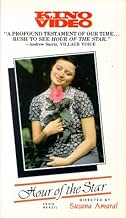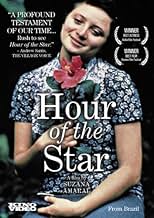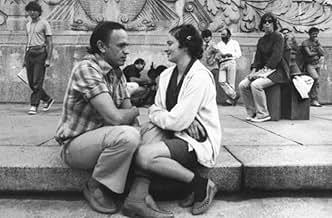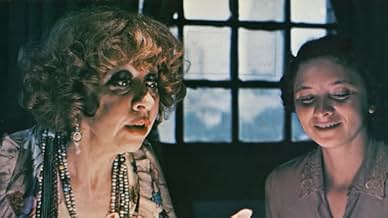IMDb-BEWERTUNG
7,4/10
1772
IHRE BEWERTUNG
Füge eine Handlung in deiner Sprache hinzuThe tale of the naive Macabéa, a 19-year-old lonely and poor woman from the Northeast of Brazil who moves to São Paulo in hopes of a better future after losing the aunt who raised her.The tale of the naive Macabéa, a 19-year-old lonely and poor woman from the Northeast of Brazil who moves to São Paulo in hopes of a better future after losing the aunt who raised her.The tale of the naive Macabéa, a 19-year-old lonely and poor woman from the Northeast of Brazil who moves to São Paulo in hopes of a better future after losing the aunt who raised her.
- Regie
- Drehbuch
- Hauptbesetzung
- Auszeichnungen
- 11 Gewinne & 1 Nominierung insgesamt
Sonia Guedes
- Joana
- (as Sônia Guedes)
Dirce Militello
- Mãe de Glória
- (as Dirce Militelo)
Euricio Martins
- Guarda do Metrô
- (as Eurico Martins)
Lizete Negreiros
- Maria
- (as Lizette Negreiros)
Empfohlene Bewertungen
Unfortunately this is just good photography and decent acting. Nothing else you can see here... The dialogues are dull and the story takes you into a jorney to nowhere. It's just a waste of time.
If you've ever read Lispector's text, Amaral's film is a must-see. You may be wondering how Amaral could possibly manage to capture Lispector's musings on the act of writing or questions regarding representation as they are presented through her narrator, Rodrigo. Pay close attention, and you'll find your answer. Although Rodrigo is absent from the film, he is symbolically present via Amaral's juxtaposition of Macabea's humble life, and the reality that is presented to her within an industrialized society. I personally believe that this is not a representation of the original text, but an appropriation of certain underlying themes within it. As you will see, Amaral manages to give us her own perspective and cultural critique of representation via the artistic medium of which she is a part. In this sense, the film stands alone, independent of the novella, with a few strong threads tying the two together. For anyone who is interested in the question of representation within the cultural industry, commodity fetishism, capitalism, feminism, etc., you need to watch this film, and then you need to watch it again.
Clarice Lispector was one of the leading writers in the Portuguese language in the last century and Susana Amaral is one of the leading Brazilian film-makers in recent years, therefore the latter's intepretation of the former's tragically real novel could only be a success.... and doesn't disappoint.
Anti-heroine Macabea, like many migrants forced to flee their North-eastern birthplaces, towns such as Paraiba, has received little or no education, has no parents, and would have remained anonymous in a world too brutal for her type had not Lispector and Amaral been brave enough to bring her tragedy to the intention of the comparatively well off lucky people that we all are.
The film narrates events in poor Macabea's life - getting a job as a typist, getting a first boyfriend in fellow migrant Olympico, losing him to her more beautiful work colleague Gloria, before the tragically inevitable conclusion. Throughout the plot is punctuated with moments of revelation as the young lady finds escapism in film stars such as Marilyn Munroe, classical music, and the taste of Coca-cola. Her lack of education reveals her poor upbringing. Constantly as viewers we shout out 'don't eat whilst sitting on the toilet!' 'Don't wipe your nose on your shirt' 'Don't put so much sugar in your coffee!' Whilst her lack of common sense provides humour, it is also tragic. The viewers find themselves speaking to the characters, advising them. If only someone had been able to do when they were younger, then they might not be so hopeless in this dog-eat-dog world. This lack of knowledge is reflected in Olimpico, who aspires to be famous, suffers from the same disease as Macabea, that of being neglected by society. When Macabea asks him what culture is, he responds, 'Culture, culture.... culture is culture.' There is a world out there, the one we viewers all know and live in. This two characters were born to exist outside it.
In one of the most beautiful scenes of this poignant film, Macabea stares at her ugly reflection in the mirror with the camera placed behind her. She states, smiling, 'I'm a typist, a virgin, and I like coca-cola.' This is very little, yet to her represents an ephinany, a moment in her life which the camera cherises as much as she does. The tragically happy ending to the film evokes both the fundamental message of Lispector's dying voice (she wrote the novel fighting a losing battle against cancer) and Amaral's feminist vision. There is a responsibility in art, that social and moral conscience that Sartre spoke of. In Brazil 'there are thousands of girls like this' (as the back of Lispector's book tells). 'Few of them ever complain and as far as I know they never protest, for there is no one to listen'. As viewers, we are listening, seeing, feeling sorry for our victim of social conditions. Upon winning the Havana film festival director's award in 1976, Amaral quoted Lispector's wish that this 'stubborn race of dwarfs... would one day vindicate the right to protest'. This is a protest film, forcing middle class viewers to sympathise with the poverty stricken dwarfs we find it so easy to ignore. It is beautifully constructed to evoke sympathy, pity, and perhaps even lead us to take more social and moral responsibility on board, as Lispector and Amaral have done.
Anti-heroine Macabea, like many migrants forced to flee their North-eastern birthplaces, towns such as Paraiba, has received little or no education, has no parents, and would have remained anonymous in a world too brutal for her type had not Lispector and Amaral been brave enough to bring her tragedy to the intention of the comparatively well off lucky people that we all are.
The film narrates events in poor Macabea's life - getting a job as a typist, getting a first boyfriend in fellow migrant Olympico, losing him to her more beautiful work colleague Gloria, before the tragically inevitable conclusion. Throughout the plot is punctuated with moments of revelation as the young lady finds escapism in film stars such as Marilyn Munroe, classical music, and the taste of Coca-cola. Her lack of education reveals her poor upbringing. Constantly as viewers we shout out 'don't eat whilst sitting on the toilet!' 'Don't wipe your nose on your shirt' 'Don't put so much sugar in your coffee!' Whilst her lack of common sense provides humour, it is also tragic. The viewers find themselves speaking to the characters, advising them. If only someone had been able to do when they were younger, then they might not be so hopeless in this dog-eat-dog world. This lack of knowledge is reflected in Olimpico, who aspires to be famous, suffers from the same disease as Macabea, that of being neglected by society. When Macabea asks him what culture is, he responds, 'Culture, culture.... culture is culture.' There is a world out there, the one we viewers all know and live in. This two characters were born to exist outside it.
In one of the most beautiful scenes of this poignant film, Macabea stares at her ugly reflection in the mirror with the camera placed behind her. She states, smiling, 'I'm a typist, a virgin, and I like coca-cola.' This is very little, yet to her represents an ephinany, a moment in her life which the camera cherises as much as she does. The tragically happy ending to the film evokes both the fundamental message of Lispector's dying voice (she wrote the novel fighting a losing battle against cancer) and Amaral's feminist vision. There is a responsibility in art, that social and moral conscience that Sartre spoke of. In Brazil 'there are thousands of girls like this' (as the back of Lispector's book tells). 'Few of them ever complain and as far as I know they never protest, for there is no one to listen'. As viewers, we are listening, seeing, feeling sorry for our victim of social conditions. Upon winning the Havana film festival director's award in 1976, Amaral quoted Lispector's wish that this 'stubborn race of dwarfs... would one day vindicate the right to protest'. This is a protest film, forcing middle class viewers to sympathise with the poverty stricken dwarfs we find it so easy to ignore. It is beautifully constructed to evoke sympathy, pity, and perhaps even lead us to take more social and moral responsibility on board, as Lispector and Amaral have done.
If you are in a bad mood or unquiet, don't try this one. There are several moments that you will think Macabea lives in a hell, and that she is too stupid to get out. But the movie is made to be analysed, and if you keep watching, you will fell it. Her relationship with Olimpico, and the antagonism of personalities, the perspective of Macabea about her life, opportunities and the future. Everything has a reason to be shown, every single word has a meaning. The movie was based on Clarice Lispector's best-seller "A Hora da Estrela" (The Star Time).
Hour of the Star (1985) is a straight forward look at life in poverty stricken Brazil. Away from the glitz and glamor of the popular traveler's paradise and away from the tourist traps. Life is hard and the outlook is very bleak for the poor working class of Brazil. But one young woman is determined to live life to the fullest. She dreams of a future that only exists in her mind. No matter what situations life dishes out, she remains oblivious to reality and remains in a fantasy world searching for a man who'll take her away from her life of poverty.
Brilliant film. I watched this one in college and I was amazed by the film-making and the strong storyline. I couldn't believe that people lived in such squalor (they make the ghettos look nice). People living on slave labor wages and doing everything they can to survive. I highly recommended this picture (if you can locate a copy).
Awesome film.
A
Brilliant film. I watched this one in college and I was amazed by the film-making and the strong storyline. I couldn't believe that people lived in such squalor (they make the ghettos look nice). People living on slave labor wages and doing everything they can to survive. I highly recommended this picture (if you can locate a copy).
Awesome film.
A
Wusstest du schon
- WissenswertesBrazil's submission to the 1987's Oscar as Best Foreign Film. Suzana Amaral was the first Brazilian female director submitted. The next female director submitted would be Anna Muylaert for Der Sommer mit Mamã (2015).
- VerbindungenFeatured in São Paulo - Sinfonia e Cacofonia (1994)
- SoundtracksCada Vez Que Ela Sai
(Música Incidental)
Written by Thibes
Performed by Ivan Prado
Top-Auswahl
Melde dich zum Bewerten an und greife auf die Watchlist für personalisierte Empfehlungen zu.
Details
Zu dieser Seite beitragen
Bearbeitung vorschlagen oder fehlenden Inhalt hinzufügen
























